2024年中考英语复习词法专题★★介词课件(共21张PPT)
文档属性
| 名称 | 2024年中考英语复习词法专题★★介词课件(共21张PPT) |  | |
| 格式 | pptx | ||
| 文件大小 | 1.2MB | ||
| 资源类型 | 教案 | ||
| 版本资源 | 通用版 | ||
| 科目 | 英语 | ||
| 更新时间 | 2024-05-20 09:07:27 | ||
图片预览

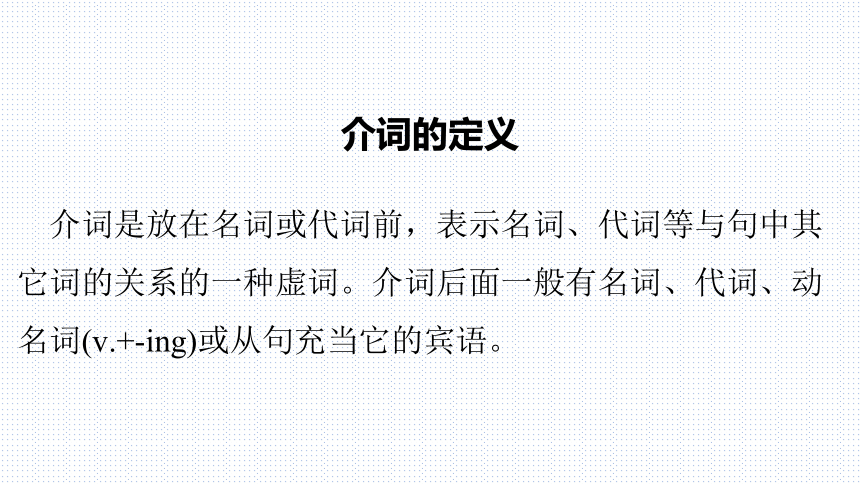
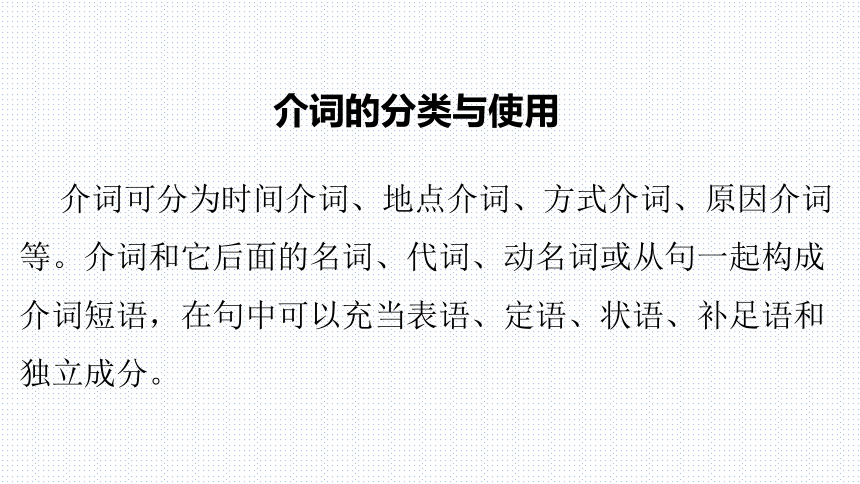
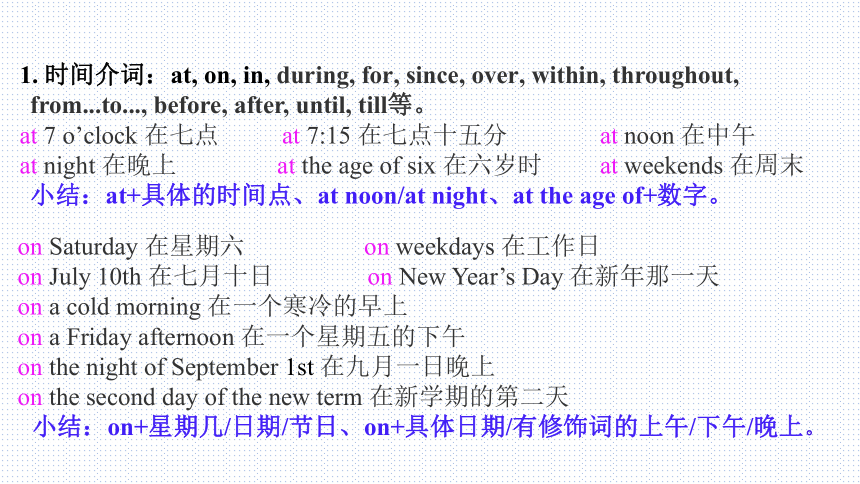
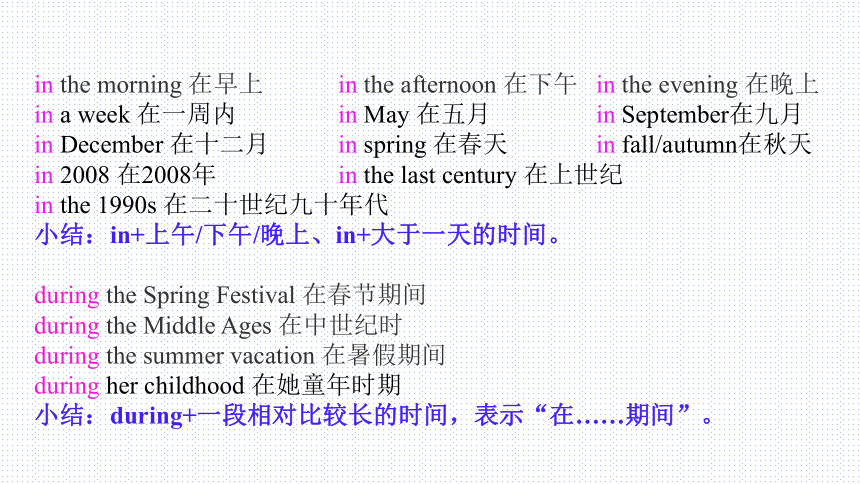
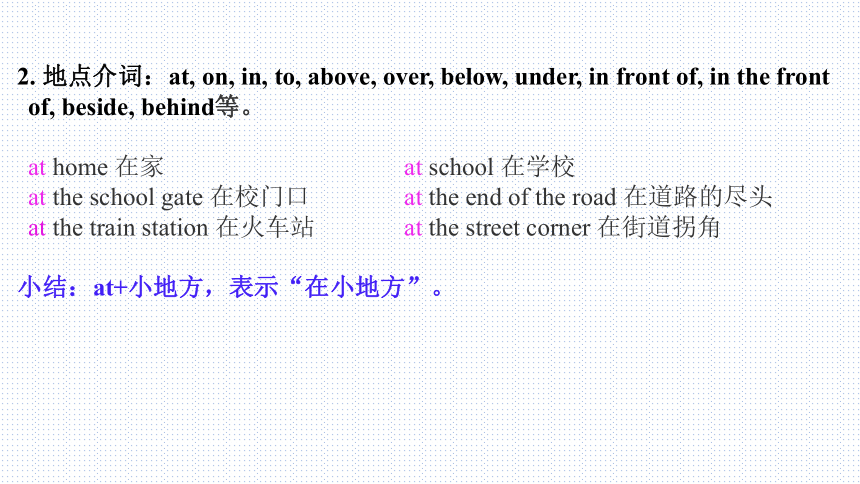
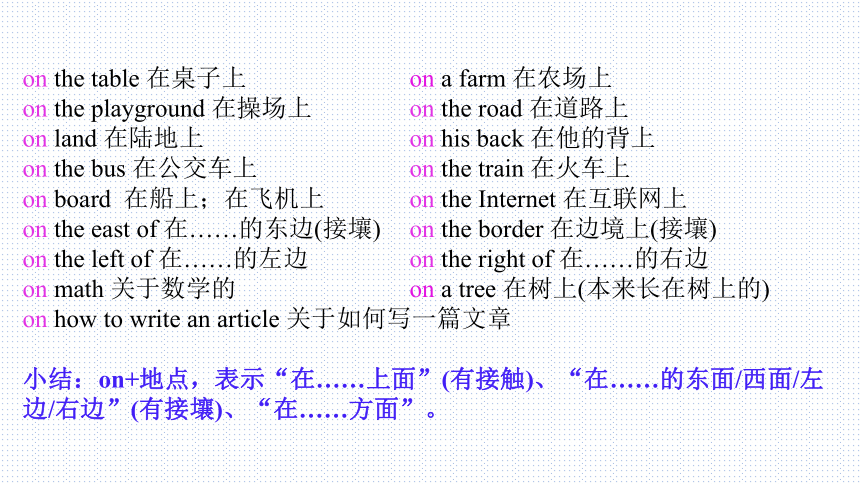
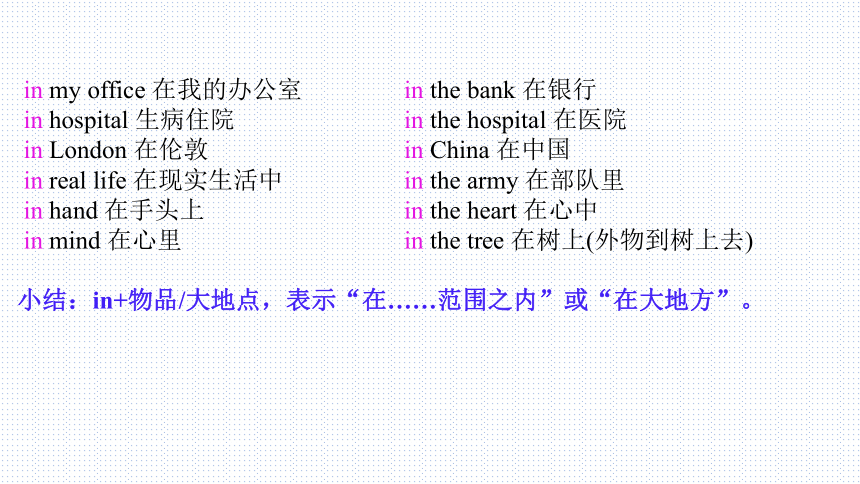
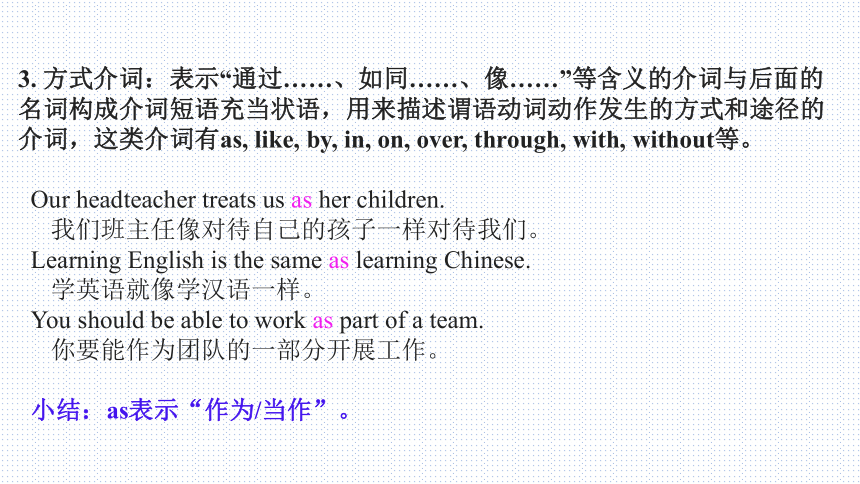
文档简介
(共21张PPT)
专题
介 词
2024年中考英语复习词法专题★★
介词是放在名词或代词前,表示名词、代词等与句中其它词的关系的一种虚词。介词后面一般有名词、代词、动名词(v.+-ing)或从句充当它的宾语。
介词的定义
介词可分为时间介词、地点介词、方式介词、原因介词等。介词和它后面的名词、代词、动名词或从句一起构成介词短语,在句中可以充当表语、定语、状语、补足语和独立成分。
介词的分类与使用
1. 时间介词:at, on, in, during, for, since, over, within, throughout, from...to..., before, after, until, till等。
at 7 o’clock 在七点 at 7:15 在七点十五分 at noon 在中午
at night 在晚上 at the age of six 在六岁时 at weekends 在周末
小结:at+具体的时间点、at noon/at night、at the age of+数字。
on Saturday 在星期六 on weekdays 在工作日
on July 10th 在七月十日 on New Year’s Day 在新年那一天
on a cold morning 在一个寒冷的早上
on a Friday afternoon 在一个星期五的下午
on the night of September 1st 在九月一日晚上
on the second day of the new term 在新学期的第二天
小结:on+星期几/日期/节日、on+具体日期/有修饰词的上午/下午/晚上。
in the morning 在早上 in the afternoon 在下午 in the evening 在晚上
in a week 在一周内 in May 在五月 in September在九月
in December 在十二月 in spring 在春天 in fall/autumn在秋天
in 2008 在2008年 in the last century 在上世纪
in the 1990s 在二十世纪九十年代
小结:in+上午/下午/晚上、in+大于一天的时间。
during the Spring Festival 在春节期间
during the Middle Ages 在中世纪时
during the summer vacation 在暑假期间
during her childhood 在她童年时期
小结:during+一段相对比较长的时间,表示“在……期间”。
2. 地点介词:at, on, in, to, above, over, below, under, in front of, in the front of, beside, behind等。
at home 在家 at school 在学校
at the school gate 在校门口 at the end of the road 在道路的尽头
at the train station 在火车站 at the street corner 在街道拐角
小结:at+小地方,表示“在小地方”。
on the table 在桌子上 on a farm 在农场上
on the playground 在操场上 on the road 在道路上
on land 在陆地上 on his back 在他的背上
on the bus 在公交车上 on the train 在火车上
on board 在船上;在飞机上 on the Internet 在互联网上
on the east of 在……的东边(接壤) on the border 在边境上(接壤)
on the left of 在……的左边 on the right of 在……的右边
on math 关于数学的 on a tree 在树上(本来长在树上的)
on how to write an article 关于如何写一篇文章
小结:on+地点,表示“在……上面”(有接触)、“在……的东面/西面/左边/右边”(有接壤)、“在……方面”。
in my office 在我的办公室 in the bank 在银行
in hospital 生病住院 in the hospital 在医院
in London 在伦敦 in China 在中国
in real life 在现实生活中 in the army 在部队里
in hand 在手头上 in the heart 在心中
in mind 在心里 in the tree 在树上(外物到树上去)
小结:in+物品/大地点,表示“在……范围之内”或“在大地方”。
3. 方式介词:表示“通过……、如同……、像……”等含义的介词与后面的名词构成介词短语充当状语,用来描述谓语动词动作发生的方式和途径的介词,这类介词有as, like, by, in, on, over, through, with, without等。
Our headteacher treats us as her children.
我们班主任像对待自己的孩子一样对待我们。
Learning English is the same as learning Chinese.
学英语就像学汉语一样。
You should be able to work as part of a team.
你要能作为团队的一部分开展工作。
小结:as表示“作为/当作”。
I’d like a blue T-shirt like this one.
我想要一件蓝色的像这样的T恤衫。
Don’t talk to me like that.
不要那样对我说话。
She looks like a model.
她看起来像一个模特。
The little boy let out a cry like a mouse.
那个小男孩发出了像老鼠一样的叫声。
The north of China, unlike the south, is windy in spring.
北方不像南方,冬天老刮风。
小结:like作介词时,表示“像……”,其反义词是“unlike”,表示“不像……”
by bus 坐公共汽车 by bike 骑自行车 by car 坐小汽车
by subway 坐地铁 by ship 坐船 by air/plane 坐飞机
This card was made by hand.
这张卡片是由手工制作的。
This bridge was built by the local villagers.
这座桥是由本地村民建造的。
小结:by表示“乘坐/由/被/用”。
4. 原因介词:表示“由于……、因为……、多亏了……”等含义的介词与后面的名词构成介词短语充当状语,用来描述谓语动词动作发生的原因的介词,这类介词有for, at, with, over, of, from等。
China is famous for her long history.
中国因历史悠久而闻名。
India is well-known for her large population.
印度因人口众多而出名。
The little boy was punished for his bad habit.
小男孩因为习惯不好受到了惩罚。
Had it not been for your timely help, we wouldn’t have finished the task in time.
要不是因为您及时帮助,我们不可能按时完成任务。
I had to turn to you for the simple reason that I couldn’t trust anybody else.
我之所以向您求助,纯粹是因为我没法相信别人。
小结:for表示“一般的原因”,后常接抽象名词。
He was surprised at the good result of the exam.
他对考试的好结果感到很惊讶。
I was amazed at her knowledge of Chinese history.
她的中国历史知识之丰富使我大为惊讶。
My headteacher got angry at the man’s words.
我班主任因为那男人的话生气了。
小结:at表示“情感的原因”,多位于表示“惊讶、生气、喜悦”等形容词或形容词化的过去分词之后。
Seeing her mother, the little girl jumped up with joy.
看到妈妈,小女孩开心地跳了起来。
When the famous scientist stepped into the hall, everyone present shouted with excitement.
当那位著名科学家步入大厅时,在场的所有人因兴奋而尖叫。
Hearing the salesgirl’s words, the customer’s face turned red with anger.
听了那女售货员的话,顾客的脸气得通红。
小结:with+情绪名词,表示“因心理状态的原因”。
5. 介词短语在句中充当的功能。
Mr Luo is in his office.
罗先生在他的办公室。
She seemed in sadness when I met her.
我认识她时,她好像处于悲痛之中。
Your name will appear at the front of the book.
你的名字将出现在书的封面上。
Our headmaster appeared on the screen.
我们校长出现在了屏幕上。
小结:介词短语位于连系动词(Link v.)之后,充当表语。
The boy in blue is my son.
穿蓝色衣服的男孩是我儿子。
The girl in a blue skirt is Jane.
穿着一条蓝色裙子的女孩是简。
The boy behind the door is Tom.
门后的男孩是汤姆。
小结:介词短语位于名词之后,用来修饰名词,介词短语充当定语。
She comes to school by subway.
她坐地铁来上学。
He stood on a chair and began his speech.
他站在一把椅子上开始了他的演讲。
She answered my question in a loud voice.
她大声地问答了我的问题。
They are having a PE lesson on the playground.
他们正在操场上上体育课。
小结:介词短语位于动词或动词短语之后,用来修饰动词或动词短语,介词短语充当状语。
I found everything in a mess when I came home from work.
下班回家,我发现家里一团乱。
Everything was found in a mess when I came home from work.
我下班回家,发现家里一团乱。
小结:介词短语可位于宾语之后充当宾语补足语,补充说明宾语所在的位置或所处的状态;介词短语也可以位于被动语态的谓语动词之后充当主语补足语,补充说明主语所在的位置或所处的状态。
In my opinion, it’s not difficult to learn English well.
在我看来,英语并不难学。
From my point of view, English is not difficult to learn.
在我看来,英语并不难学。
小结:介词短语可位于句首,在句中充当独立成分。
6. 学习介词的重点:高考题重点考察介词与名词的搭配、动词与介词的搭配。
See you !
专题
介 词
2024年中考英语复习词法专题★★
介词是放在名词或代词前,表示名词、代词等与句中其它词的关系的一种虚词。介词后面一般有名词、代词、动名词(v.+-ing)或从句充当它的宾语。
介词的定义
介词可分为时间介词、地点介词、方式介词、原因介词等。介词和它后面的名词、代词、动名词或从句一起构成介词短语,在句中可以充当表语、定语、状语、补足语和独立成分。
介词的分类与使用
1. 时间介词:at, on, in, during, for, since, over, within, throughout, from...to..., before, after, until, till等。
at 7 o’clock 在七点 at 7:15 在七点十五分 at noon 在中午
at night 在晚上 at the age of six 在六岁时 at weekends 在周末
小结:at+具体的时间点、at noon/at night、at the age of+数字。
on Saturday 在星期六 on weekdays 在工作日
on July 10th 在七月十日 on New Year’s Day 在新年那一天
on a cold morning 在一个寒冷的早上
on a Friday afternoon 在一个星期五的下午
on the night of September 1st 在九月一日晚上
on the second day of the new term 在新学期的第二天
小结:on+星期几/日期/节日、on+具体日期/有修饰词的上午/下午/晚上。
in the morning 在早上 in the afternoon 在下午 in the evening 在晚上
in a week 在一周内 in May 在五月 in September在九月
in December 在十二月 in spring 在春天 in fall/autumn在秋天
in 2008 在2008年 in the last century 在上世纪
in the 1990s 在二十世纪九十年代
小结:in+上午/下午/晚上、in+大于一天的时间。
during the Spring Festival 在春节期间
during the Middle Ages 在中世纪时
during the summer vacation 在暑假期间
during her childhood 在她童年时期
小结:during+一段相对比较长的时间,表示“在……期间”。
2. 地点介词:at, on, in, to, above, over, below, under, in front of, in the front of, beside, behind等。
at home 在家 at school 在学校
at the school gate 在校门口 at the end of the road 在道路的尽头
at the train station 在火车站 at the street corner 在街道拐角
小结:at+小地方,表示“在小地方”。
on the table 在桌子上 on a farm 在农场上
on the playground 在操场上 on the road 在道路上
on land 在陆地上 on his back 在他的背上
on the bus 在公交车上 on the train 在火车上
on board 在船上;在飞机上 on the Internet 在互联网上
on the east of 在……的东边(接壤) on the border 在边境上(接壤)
on the left of 在……的左边 on the right of 在……的右边
on math 关于数学的 on a tree 在树上(本来长在树上的)
on how to write an article 关于如何写一篇文章
小结:on+地点,表示“在……上面”(有接触)、“在……的东面/西面/左边/右边”(有接壤)、“在……方面”。
in my office 在我的办公室 in the bank 在银行
in hospital 生病住院 in the hospital 在医院
in London 在伦敦 in China 在中国
in real life 在现实生活中 in the army 在部队里
in hand 在手头上 in the heart 在心中
in mind 在心里 in the tree 在树上(外物到树上去)
小结:in+物品/大地点,表示“在……范围之内”或“在大地方”。
3. 方式介词:表示“通过……、如同……、像……”等含义的介词与后面的名词构成介词短语充当状语,用来描述谓语动词动作发生的方式和途径的介词,这类介词有as, like, by, in, on, over, through, with, without等。
Our headteacher treats us as her children.
我们班主任像对待自己的孩子一样对待我们。
Learning English is the same as learning Chinese.
学英语就像学汉语一样。
You should be able to work as part of a team.
你要能作为团队的一部分开展工作。
小结:as表示“作为/当作”。
I’d like a blue T-shirt like this one.
我想要一件蓝色的像这样的T恤衫。
Don’t talk to me like that.
不要那样对我说话。
She looks like a model.
她看起来像一个模特。
The little boy let out a cry like a mouse.
那个小男孩发出了像老鼠一样的叫声。
The north of China, unlike the south, is windy in spring.
北方不像南方,冬天老刮风。
小结:like作介词时,表示“像……”,其反义词是“unlike”,表示“不像……”
by bus 坐公共汽车 by bike 骑自行车 by car 坐小汽车
by subway 坐地铁 by ship 坐船 by air/plane 坐飞机
This card was made by hand.
这张卡片是由手工制作的。
This bridge was built by the local villagers.
这座桥是由本地村民建造的。
小结:by表示“乘坐/由/被/用”。
4. 原因介词:表示“由于……、因为……、多亏了……”等含义的介词与后面的名词构成介词短语充当状语,用来描述谓语动词动作发生的原因的介词,这类介词有for, at, with, over, of, from等。
China is famous for her long history.
中国因历史悠久而闻名。
India is well-known for her large population.
印度因人口众多而出名。
The little boy was punished for his bad habit.
小男孩因为习惯不好受到了惩罚。
Had it not been for your timely help, we wouldn’t have finished the task in time.
要不是因为您及时帮助,我们不可能按时完成任务。
I had to turn to you for the simple reason that I couldn’t trust anybody else.
我之所以向您求助,纯粹是因为我没法相信别人。
小结:for表示“一般的原因”,后常接抽象名词。
He was surprised at the good result of the exam.
他对考试的好结果感到很惊讶。
I was amazed at her knowledge of Chinese history.
她的中国历史知识之丰富使我大为惊讶。
My headteacher got angry at the man’s words.
我班主任因为那男人的话生气了。
小结:at表示“情感的原因”,多位于表示“惊讶、生气、喜悦”等形容词或形容词化的过去分词之后。
Seeing her mother, the little girl jumped up with joy.
看到妈妈,小女孩开心地跳了起来。
When the famous scientist stepped into the hall, everyone present shouted with excitement.
当那位著名科学家步入大厅时,在场的所有人因兴奋而尖叫。
Hearing the salesgirl’s words, the customer’s face turned red with anger.
听了那女售货员的话,顾客的脸气得通红。
小结:with+情绪名词,表示“因心理状态的原因”。
5. 介词短语在句中充当的功能。
Mr Luo is in his office.
罗先生在他的办公室。
She seemed in sadness when I met her.
我认识她时,她好像处于悲痛之中。
Your name will appear at the front of the book.
你的名字将出现在书的封面上。
Our headmaster appeared on the screen.
我们校长出现在了屏幕上。
小结:介词短语位于连系动词(Link v.)之后,充当表语。
The boy in blue is my son.
穿蓝色衣服的男孩是我儿子。
The girl in a blue skirt is Jane.
穿着一条蓝色裙子的女孩是简。
The boy behind the door is Tom.
门后的男孩是汤姆。
小结:介词短语位于名词之后,用来修饰名词,介词短语充当定语。
She comes to school by subway.
她坐地铁来上学。
He stood on a chair and began his speech.
他站在一把椅子上开始了他的演讲。
She answered my question in a loud voice.
她大声地问答了我的问题。
They are having a PE lesson on the playground.
他们正在操场上上体育课。
小结:介词短语位于动词或动词短语之后,用来修饰动词或动词短语,介词短语充当状语。
I found everything in a mess when I came home from work.
下班回家,我发现家里一团乱。
Everything was found in a mess when I came home from work.
我下班回家,发现家里一团乱。
小结:介词短语可位于宾语之后充当宾语补足语,补充说明宾语所在的位置或所处的状态;介词短语也可以位于被动语态的谓语动词之后充当主语补足语,补充说明主语所在的位置或所处的状态。
In my opinion, it’s not difficult to learn English well.
在我看来,英语并不难学。
From my point of view, English is not difficult to learn.
在我看来,英语并不难学。
小结:介词短语可位于句首,在句中充当独立成分。
6. 学习介词的重点:高考题重点考察介词与名词的搭配、动词与介词的搭配。
See you !
同课章节目录
- 词法
- 名词
- 动词和动词短语
- 动词语态
- 动词时态
- 助动词和情态动词
- 非谓语动词
- 冠词
- 代词
- 数词和量词
- 形容词副词及其比较等级
- 介词和介词短语
- 连词和感叹词
- 构词法
- 相似、相近词比较
- 句法
- 陈述句
- 一般疑问句和否定疑问句
- 特殊疑问句及选择疑问句
- 反意疑问句
- 存在句(There be句型)
- 宾语从句
- 定语从句
- 状语从句
- 主谓一致问题
- 简单句
- 并列句
- 复合句
- 主谓一致
- 主、表语从句
- 名词性从句
- 直接引语和间接引语
- 虚拟语气
- 感叹句
- 强调句
- 倒装句
- 祈使句
- 句子的成分
- 句子的分类
- 题型专区
- 单项选择部分
- 易错题
- 完形填空
- 阅读理解
- 词汇练习
- 听说训练
- 句型转换
- 补全对话
- 短文改错
- 翻译
- 书面表达
- 任务型阅读
- 语法填空
- 其他资料
